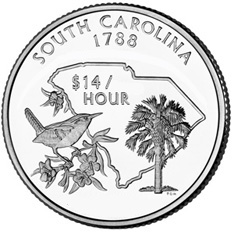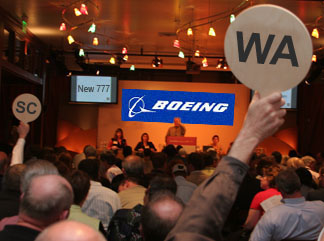OPINION
Boeing: We don’t do better if we all do worse
(July 17, 2013) — Washington State has a world-class aerospace cluster, employing more than 130,000 people making products the rest of the world wants to buy. In 2003, Boeing cast a chill on the state, moving its headquarters to Chicago. In 2009, the chill deepened with the decision to assemble some 787s in South Carolina.
This trend continues with recent announcements to move engineering work to Southern California, start an engineering center in South Carolina and transfer computing and pilot training work, too.
One interpretation is that Boeing is so averse to unions that it will move to any region committed to suppressing unions — South Carolina being a case in point.
Some industry observers and elected officials conclude that Washington State should weaken unions, to “compete.” There’s something creepy about this.
Several years ago, this argument came up at an aerospace supplier conference in Lynnwood. A local participant spoke passionately, saying that South Carolina had the right idea, and we needed to weaken worker rights in Washington, starting right now.
 I reminded him that South Carolina’s Attorney General was proud that wages in South Carolina were among the lowest in the country. He was OK with sharing as little of any gains with workers as possible. Workers in South Carolina would have lower wages, and less job security. They would stay behind other states in health care, retirement, and layoff protections, and that would be good public policy.
I reminded him that South Carolina’s Attorney General was proud that wages in South Carolina were among the lowest in the country. He was OK with sharing as little of any gains with workers as possible. Workers in South Carolina would have lower wages, and less job security. They would stay behind other states in health care, retirement, and layoff protections, and that would be good public policy.
I don’t think Washington is ready to join South Carolina with policies to deny workers any share of gains from productivity improvements, innovation, creativity, dedication to products and customers, or hard work.
We hear a lot about the failed contract talks and the strike in 2008 as “the reason” customers and investors were unhappy. We should recall that the 787 program suffered 3 years of delays and costs ballooned more than $30 billion.
Sure, unions can give Boeing a convenient diversion, but that distracts us from a larger truth. The 787’s problems were part and parcel of an extraordinarily risky, badly-executed business strategy. The 787 was a sharp departure from the closely managed business model used successfully in the past, based on sound technical judgment, strong coordination, effective problem-solving, and close communication through the design and manufacturing organizations.
Labor costs are actually a small fraction of an airplane’s price. Learning curve and productivity gains are the real difference between success and failure in the aerospace industry. Experienced workers with good problem-solving skills drive those dramatic cost reductions.
With that in mind, it’s fair to ask, “Did Boeing learn a lesson from the 787 program?” I know my answer to that question.
To our credit, Washington State has consistently chosen a high-road strategy for economic development. We argue that productivity, innovation, creativity, customized vocational schools, world-class apprenticeship programs, and a statewide coalition of business, government, and labor coordinate to make our aerospace industry cluster an engine for shared prosperity and growth. Our high-road strategy is a competitive advantage for existing employers. It can also attract new employers to move here, either from other regions of the U.S., or from other countries. That was our state’s message at the Paris Air Show this year, and two years ago.
Look at what has happened to America in the last 40 years. Inequality is growing, wages are stagnant, production is moving overseas and a generation of young people is coming to realize that their living standards will fall short of previous generations.
 I understand the impulse to chase any scrap of favor in a race to the bottom. It’s still creepy. It really says that workers and unions are not legitimate stakeholders in our democracy. With unions out of the way, other institutions of civil society will gradually be pushed aside, too, to please only global businesses.
I understand the impulse to chase any scrap of favor in a race to the bottom. It’s still creepy. It really says that workers and unions are not legitimate stakeholders in our democracy. With unions out of the way, other institutions of civil society will gradually be pushed aside, too, to please only global businesses.
It’s also troublesome that Washington State and Kansas delivered our incentives and political support for the 787 in 2003, and the Air Force tanker a few years ago, only to see Boeing walk back on those commitments, drawing into question the value we receive in return for public sacrifice.
Restoring prosperity is a complex national problem, with many moving parts. Still, we can’t set policies that work only for large companies. If we shift economic and political power away from workers, families and communities, that new reality will apply to all areas of public life. We will see more inequality, more insecurity, fewer opportunities and lower living standards.
A good deal works for both sides. We know when a deal works for a big employer like Boeing. We should also know when the deal works for our community. Each worker is also a customer, a neighbor, friend, or relative. We won’t do better if we all do worse.
Stan Sorscher is labor representative at the Society of Professional Engineering Employees in Aerospace (SPEEA), IFPTE 2001. This column, which originally appeared at the Puget Sound Business Journal’s website, is posted here with the author’s permission.






